Part 50: Bonus Update #3: The Great Evil King and the Elephant in the Room
Bonus Update #3: The Great Evil King and the Elephant in the RoomSo throughout this entire Let's Play I've been mentioning a series of games called the Banner Saga. In fact, the developers themselves acknowledge that the Banner Saga was one of their major influences and that the Stoic developers who made TBS are actually kickstarter backers of this game. Ok, fair enough. So you'd think this game would be different enough that it's not a clear case of plagarism, right?
Bijou has a point. It's possible to be derivative without being completely unoriginal, like how (to quote Artix and Fedule) Darksiders is a Zelda-like that adds its own thing. Is this really true here?
I'm stealing Banner Saga images from FairGame's excellent LP again.
Thematic Similarities between Banner Saga and Ash of Gods
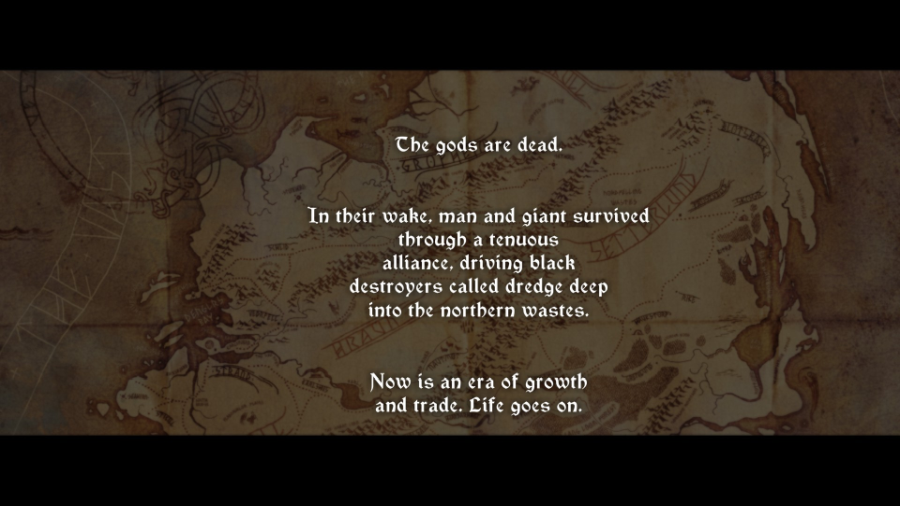
This is the first image of the Banner Saga. The gods are dead yet man lives on. Now this game is literally called "Ash of Gods" and the developer quote in the OP is about mankind reacting to a world without gods. Both games are about a father and a daughter trying to survive a literal apocalypse (stone men fleeing the end of the world vs a plague and evil angels possessing corpses) and heavily feature Large Decisions With Consequences. We're not doing so well on the originality front, because Ash of Gods isn't actually original. It's transposing empty interpretations of the characters from Banner Saga - and many plot beats - into a less original setting of Medieval Europe that you might recognize if you've ever played Dungeons and Dragons. Here, take a look at some scenes from the beginning of each game.
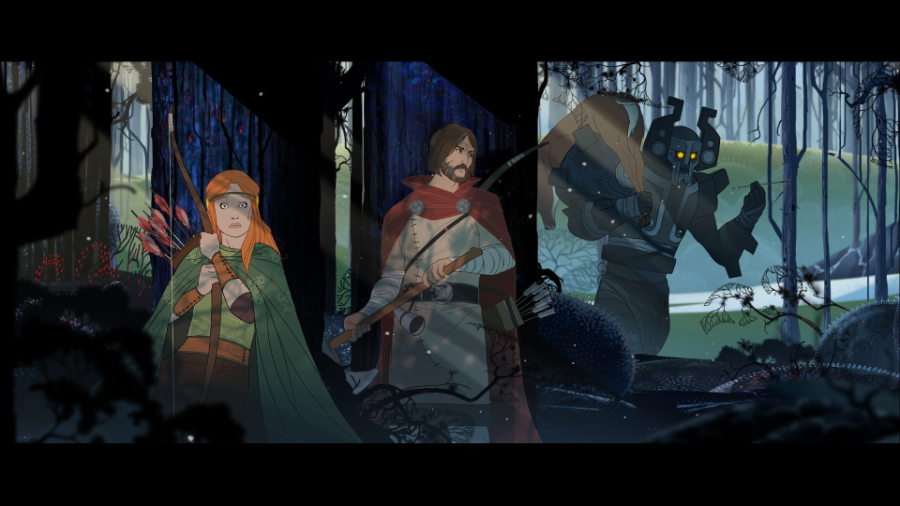
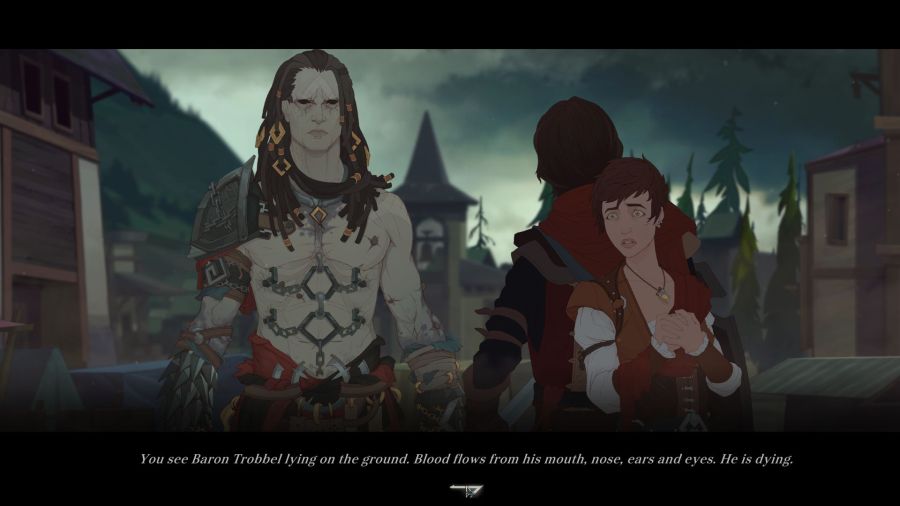
Yea, OK, in Banner Saga they're hiding from the monster who's just trying to eat a deer while in Ash of Gods Thorn is forced into confronting the monster who massacred his way through the town. That Dredge could also get service at a McDonalds while Dorpkhal looks like he's into kinky sex shit (this is a mature story you see). It's the same premise. Father is interposing himself between monster and terrified daughter. This continues in both games with the the family forced to flee and put in command of an unwilling band of followers - the village for Rook (the Banner Saga's protagonist) and the remnants of the city guard for Thorn. This leads to a general story where both Rook and Thorn try to lead their family and followers to an ever-shifting destination looking for safety from the apocalypse, and forced to rely on the strength of men and women because the gods are dead.
But what about the PoV characters? Lo Pheng isn't Hakon!
I will grant that Lo Pheng the assassin trying to find himself is a vastly different character than Hakon the reluctant giant king trying to figure out what the hell to do with the taxes and the annoying human prince accompanying him as the world ends. Hopper, however, is a completely different story.
As the thread has pointed out, there's a wizard in the Banner Saga named Eyvind who shares some similarities with Hopper in that they both pass themselves off as wandering hedge mages when they're actually some of the most dangerous beings in their respective settings (the most powerful mage in the world and a renegade angel respectively). It turns out that in addition to their obvious similarities they're ALSO responsible for the world-ending apocalypses. Eyvind causes the dredge to start invading the surface world by using forbidden dark magic to resurrect his dead girlfriend, and Hopper fails to...do whatever the fuck they were doing in the prologue and allows the Reapers to escape. Much of the plot of each game is driven by these magicians seeking to put right what they did wrong to fix their broken worlds and avoid the extinction of humanity.
So what about the story is actually different? I suppose Ash of Gods lets you straight up kill PoV parties if you fuck up (while generally Banner Saga would kill a character or two or some of the NPC caravan) but ultimate the characters of Ash of Gods are just surlier and more unpleasant. Thorn is an abrasive asshole motivated by love for his children, but is also held up as The Greatest Swordsman Ever. All the women want to bang him and all the men want to be him, but he's just an unpleasant asshole with murderous instincts. Rook on the other hand is a fairly decent everyman struggling with the burden of leadership. Now I personally think Rook is the more engaging of the two because his struggle is real and he doesn't have a legion of characters to sing his praises, but what do I know aside from basic English sentence structure, something the AoG devs have yet to master?
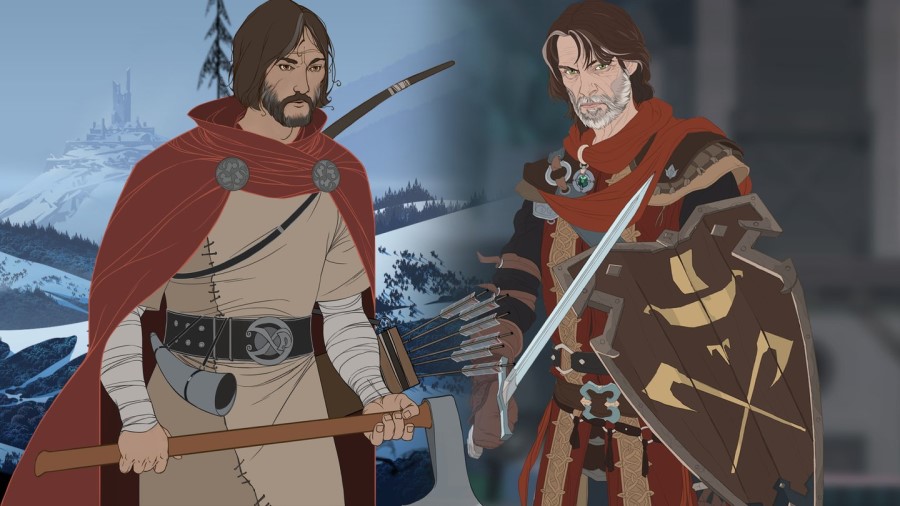
They at least innovated on gameplay, right?
Kind of? There's enough "innovation" so that you can say it's different, but it's very much changed just enough so that you can see the influence. Instead of managing the caravan's food you manage the magic rocks that protect you from the plague. Instead of breaking armor you attack people's energy bar so they take more damage. Both game's battle systems feature an IGOUGO system that is supposed to prioritize weakening enemies rather than focus firing them to kill them, however only Banner Saga's works as intended because the Ash of Gods developers are incompetent. The big innovation is that you get the battle cards, which need to be painfully assembled fragment by fragment only for you to discover half the deck is useless because they're all reliant on RNG to target...unless you're exploiting the battle system and just running Lo Pheng by himself or something. The dialog system is extremely similar.
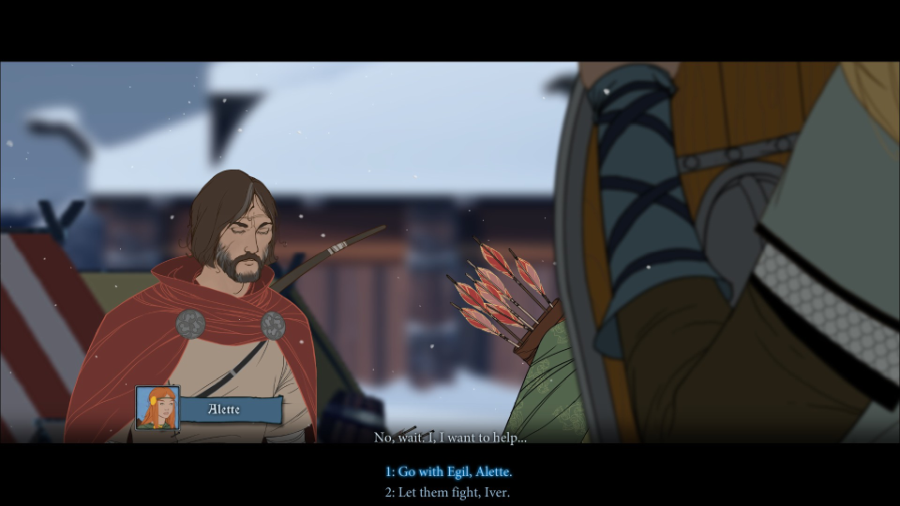
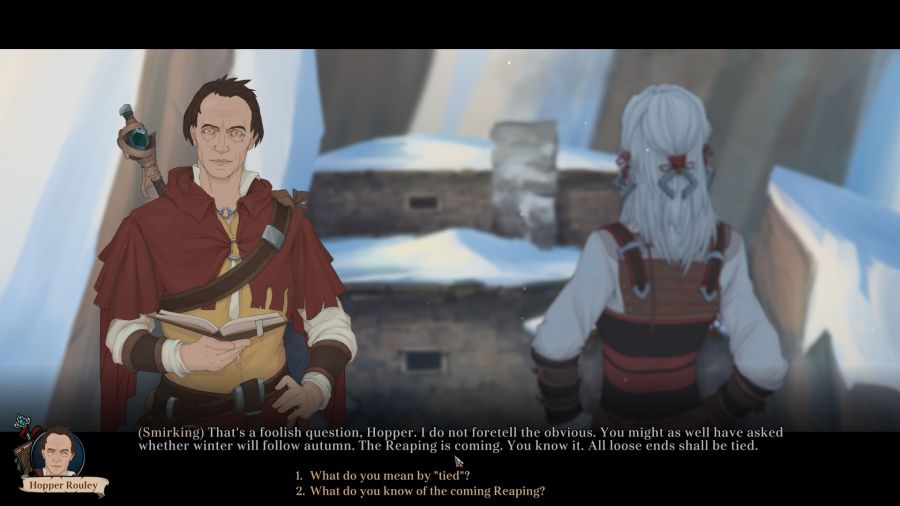
Maybe I'm nuts but even the font looks similar.
Anyway, that's Ash of Gods in a nutshell. Just enough is changed so that the devs can trick you into thinking that this is totally different and interesting, but once you get past the surface it's Banner Saga all the way down. Thorn and Gleda are just Rook and Alette as imagined by a 14 year old youtube commenter writing about "epicness", Hopper is Eyvind stripped of everything that made Eyvind interesting and relatable (such as the epilepsy or the love of Juno) and replaced with said 14-year-old's attempt at copying Joss Whedon, and the only thing left that's in any way original is Lo Pheng's storyline, which is also the shortest of the three and yet the tightest thematically with the most interesting characters. If they had actually come up with a unique set of themes and characters to explore rather than "a father and daughter must survive in a world where the gods are dead" people would be a lot less willing to accuse this game of plagarism.
A word on translation
So throughout this LP I've been commenting on how the translation is bad and that's probably affecting my perception of the game.
I don't think I've been as critical of the many, many bad ideas the game presumably brought over from the original Russian, but I can't imagine the Russian writing being in any way good. I can't comment on the prose, but the plot so far has been fairly idiotic and contrived, and I cannot imagine the constant stage directions - because they don't trust their own dialogue to convey information - to be merely a translator's conceit. The writing of the characters in the game is completely different than their online story excerpts (Gleda acts like she's 12), none of the politics makes any sense, there's no real reason for anyone to be following along with Chila's goal (and we will get there) or methods, and the writers seem to think they have made a morally grey, complex conflict where one of the sides murders children as a sacrifice to dark powers.
When I started this LP, I had been intending to use this as an example of a flawed game that could have been good if the developers had had more experience. This game is just bad.